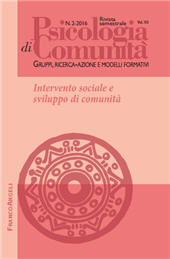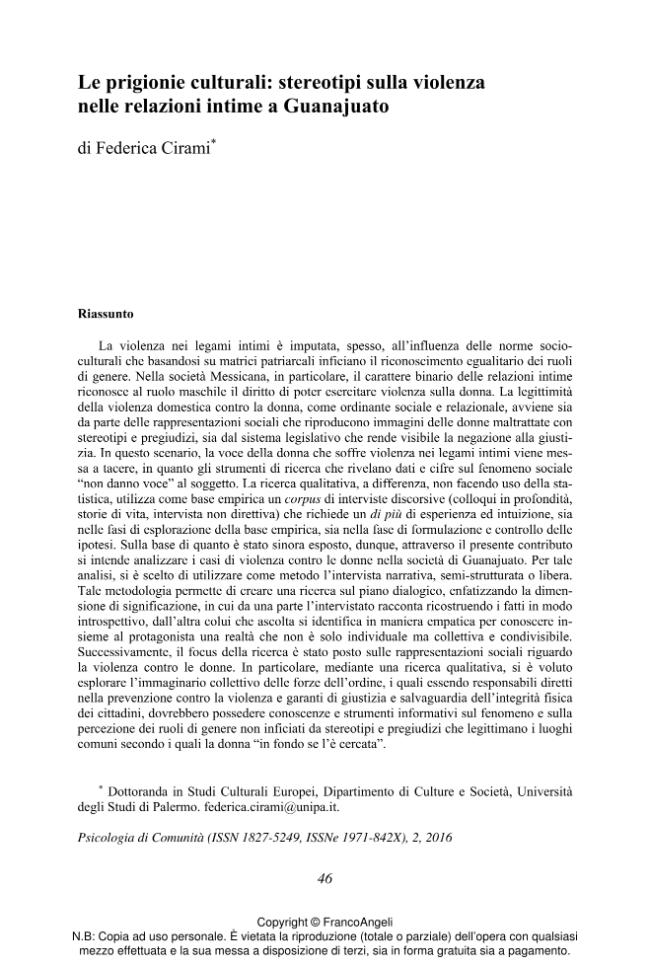Le prigionie culturali : stereotipi sulla violenza nelle relazioni intime a Guanajuato
46-56 p.
La violenza nei legami intimi è imputata, spesso, all'influenza delle norme socio-culturali che basandosi su matrici patriarcali inficiano il riconoscimento egualitario dei ruoli di genere. Nella società Messicana, in particolare, il carattere binario delle relazioni intime riconosce al ruolo maschile il diritto di poter esercitare violenza sulla donna. La legittimità della violenza domestica contro la donna, come ordinante sociale e relazionale, avviene sia da parte delle rappresentazioni sociali che riproducono immagini delle donne maltrattate con stereotipi e pregiudizi, sia dal sistema legislativo che rende visibile la negazione alla giustizia. In questo scenario, la voce della donna che soffre violenza nei legami intimi viene messa a tacere, in quanto gli strumenti di ricerca che rivelano dati e cifre sul fenomeno sociale "non danno voce" al soggetto.
La ricerca qualitativa, a differenza, non facendo uso della statistica, utilizza come base empirica un corpus di interviste discorsive (colloqui in profondità, storie di vita, intervista non direttiva) che richiede un di più di esperienza ed intuizione, sia nelle fasi di esplorazione della base empirica, sia nella fase di formulazione e controllo delle ipotesi. Sulla base di quanto è stato sinora esposto, dunque, attraverso il presente contributo si intende analizzare i casi di violenza contro le donne nella società di Guanajuato. Per tale analisi, si è scelto di utilizzare come metodo l'intervista narrativa, semi-strutturata o libera. Tale metodologia permette di creare una ricerca sul piano dialogico, enfatizzando la dimensione di significazione, in cui da una parte l'intervistato racconta ricostruendo i fatti in modo introspettivo, dall'altra colui che ascolta si identifica in maniera empatica per conoscere insieme al protagonista una realtà che non è solo individuale ma collettiva e condivisibile.
Successivamente, il focus della ricerca è stato posto sulle rappresentazioni sociali riguardo la violenza contro le donne. In particolare, mediante una ricerca qualitativa, si è voluto esplorare l'immaginario collettivo delle forze dell'ordine, i quali essendo responsabili diretti nella prevenzione contro la violenza e garanti di giustizia e salvaguardia dell'integrità fisica dei cittadini, dovrebbero possedere conoscenze e strumenti informativi sul fenomeno e sulla percezione dei ruoli di genere non inficiati da stereotipi e pregiudizi che legittimano i luoghi comuni secondo i quali la donna "in fondo se l'è cercata". [Testo dell'editore].
Intimate Partner Violence is allocated, often, to the influence of socio-cultural norms based on patriarchal matrix that disrupt the recognition of egalitarian gender roles. In Mexican society, in particular, the binary nature of intimate relationships recognizes to the male role the right to exercise violence against women. The legitimacy of domestic violence against women, such as social and relational regulator, takes place both by the social representations that reproduce images of battered women with stereotypes and prejudices, and the legislative system that makes visible the denial state of justice. In this scenario, the voice of the woman who has suffered violence in intimate relationships is silenced, thus researches that reveal data on the social phenomenon "do not give voice" to the subject.
Unlike qualitative research, avoiding statistics, uses as empirical basis a corpus of conversational interviews (in-depth interviews, life stories, non-directive interview) that require more experience and intuition, both in stages of exploration of the empirical basis and in the formulation and monitoring of the hypotheses. Therefore, on the basis of what has been exposed through this contribution there will be analyzed the cases of violence against women in Guanajuato society. For this analysis, it has been chosen the method of narrative semi-structured or free interview. This methodology allows to create a search on the dialogical plan, emphasizing the dimension of signification, in which on the one hand the interviewee tells reconstructing the facts in the introspective way, and on the other the listener identifies with empathic way to learn along with the main character a reality that it is not only individual but collective and shareable.
Successively, the research focuses on the analysis of social representations about violence against women. In particular, by conducting qualitative research, it will be explored the collective imagination of the police officers. In fact, they are directly responsible for the prevention against violence and guarantors of justice and the physical integrity and safeguard of citizens, and consequently they should possess knowledge and informational tools both on this phenomenon and on the perception of gender roles uninfluenced by stereotypes and prejudices that justify the stereotypes according to the principle "woman deserves it", because "she was asking for it". [Publisher's Text].
-
Artikel aus derselben Ausgabe (einzeln erhältlich)
-
Informationen
ISSN: 1971-842X
KEYWORDS
- Violenza nei legami intimi, Messico, stereotipi di genere, rappresentazioni sociali, intervista biografica, sessismo
- Intimate partner violence, Mexico, gender stereotypes, social representations of IPV, biographic interview, sexism



